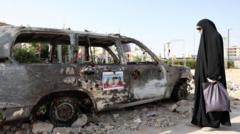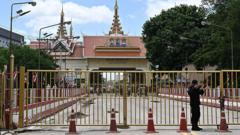Israel and Iran exchange threats and counterclaims just hours after ceasefire announcement.
**Iran-Israel Conflict: Tensions Escalate Despite Ceasefire Agreement**

**Iran-Israel Conflict: Tensions Escalate Despite Ceasefire Agreement**
Recent ceasefire brokered by Trump and Qatar faces immediate accusations of violation.
On Tuesday, an agreement announced just after 05:00 GMT aimed to halt hostilities between Israel and Iran, with former U.S. President Donald Trump and Qatar acting as mediators. However, accusations from Israel claiming that Iran violated the truce came just hours later, igniting tensions anew. Israeli Defence Minister Israel Katz condemned Iran for purportedly launching missile attacks on Israel post-agreement, stating that Israel would retaliate "forcefully" against any aggression from Tehran.
Iran, on its part, has denied these allegations, insisting that no missiles were launched towards Israel, while affirming its readiness to respond decisively to any Israeli threats. The ceasefire was said to be a mutual decision following days of severe conflict that began with Iran's missile launch toward a U.S. base in Qatar, reported as retaliation for American strikes on its nuclear sites.
The truce was initially announced by Trump late Monday, claiming its intentions to end "the 12-day war." Just after the ceasefire came into effect, the Israel Defense Forces (IDF) claimed to have detected missile launches from Iranian territory. Katz criticized Iran for breaching the ceasefire's terms, maintaining that military operations targeting Iranian assets would continue.
Hours into the ceasefire, both countries have reported ongoing tensions, with the IDF stating they had struck missile launch installations within Iran. Moreover, Iranian state media has reported significant air defense activity in Tehran, indicating that the conflict remains far from resolution despite the ceasefire agreement.
As the situation unfolds, the global community continues to monitor these developments, which pose serious implications for regional stability and international relations in the Middle East.
Iran, on its part, has denied these allegations, insisting that no missiles were launched towards Israel, while affirming its readiness to respond decisively to any Israeli threats. The ceasefire was said to be a mutual decision following days of severe conflict that began with Iran's missile launch toward a U.S. base in Qatar, reported as retaliation for American strikes on its nuclear sites.
The truce was initially announced by Trump late Monday, claiming its intentions to end "the 12-day war." Just after the ceasefire came into effect, the Israel Defense Forces (IDF) claimed to have detected missile launches from Iranian territory. Katz criticized Iran for breaching the ceasefire's terms, maintaining that military operations targeting Iranian assets would continue.
Hours into the ceasefire, both countries have reported ongoing tensions, with the IDF stating they had struck missile launch installations within Iran. Moreover, Iranian state media has reported significant air defense activity in Tehran, indicating that the conflict remains far from resolution despite the ceasefire agreement.
As the situation unfolds, the global community continues to monitor these developments, which pose serious implications for regional stability and international relations in the Middle East.























